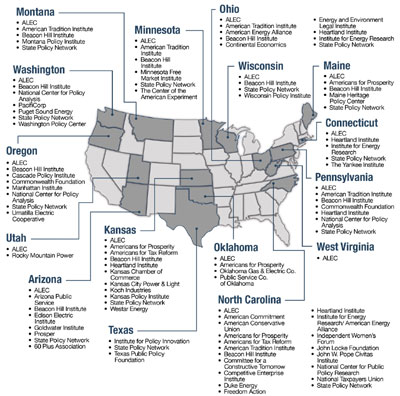These last few weeks leading up to the November elections will be littered with dark money from the Koch Bros as they move in for the finale assault to make sure their Republican puppets are elected.
In Michigan, for example, Democrat Rep. Gary Peters is in a tough race for the Senate largely because he stands up to the Koch Brothers. He accused them of turning Detroit into their personal trash can, leaving huge toxic piles of petroleum coke near the Detroit River – a byproduct of tar sands production.
An in depth article in Rolling Stone uncovers the slimy underbelly of the company, "Inside the Koch Brothers’ Toxic Empire."
"Together, Charles and David Koch control one of the world’s largest fortunes, which they are using to buy up our political system. But what they don’t want you to know is how they made all that money," says Tim Dickinsin, author of the article.
Koch’s political web of front groups attacking state renewable energy policies:

Here are a few excerpts:
The Kochs are our homegrown oligarchs; they’ve cornered the market on Republican politics and are nakedly attempting to buy Congress and the White House. Their political network helped finance the Tea Party and powers today’s GOP. Koch-affiliated organizations raised some $400 million during the 2012 election, and aim to spend another $290 million to elect Republicans in this year’s midterms. So far in this cycle, Koch-backed entities have bought 44,000 political ads to boost Republican efforts to take back the Senate.
Under the nearly five-decade reign of CEO Charles Koch, the company has paid out record civil and criminal environmental penalties. And in 1999, a jury handed down to Koch’s pipeline company what was then the largest wrongful-death judgment of its type in U.S. history, resulting from the explosion of a defective pipeline that incinerated a pair of Texas teenagers.
The volume of Koch Industries’ toxic output is staggering. According to the University of Massachusetts Amherst’s Political Economy Research Institute, only three companies rank among the top 30 polluters of America’s air, water and climate: ExxonMobil, American Electric Power and Koch Industries. Thanks in part to its 2005 purchase of paper-mill giant Georgia-Pacific, Koch Industries dumps more pollutants into the nation’s waterways than General Electric and International Paper combined. The company ranks 13th in the nation for toxic air pollution. Koch’s climate pollution, meanwhile, outpaces oil giants including Valero, Chevron and Shell. Across its businesses, Koch generates 24 million metric tons of greenhouse gases a year.
For Koch, this license to pollute amounts to a perverse, hidden subsidy. The cost is borne by communities in cities like Port Arthur, Texas, where a Koch-owned facility produces as much as 2 billion pounds of petrochemicals every year. In March, Koch signed a consent decree with the Department of Justice requiring it to spend more than $40 million to bring this plant into compliance with the Clean Air Act.
The company controls at least four oil refineries, six ethanol plants, a natural-gas-fired power plant and 4,000 miles of pipeline. Koch is now a key player in the fracking boom and has quietly acquired leases for 1.1 million acres of Alberta [tar sand] oil fields, an area larger than Rhode Island.
The one truly bad outcome for Koch would be if Keystone XL were to be defeated, as many environmentalists believe it must be. "If the signal that sends is that no new pipelines will be built across the U.S. border for carrying oil-sands product, that’s going to have an impact not just on Koch leases, but on everybody’s asset value in oil sands," says Andrew Leach, an energy and environmental economist at the University of Alberta.
Ironically, what’s best for Koch’s tar-sands interests is what the Obama administration is currently delivering: "They’re actually ahead if Keystone XL gets delayed a while but hangs around as something that still might happen," Leach says.
The Dodd-Frank bill was supposed to put an end to economy-endangering speculation in the $700 trillion global derivatives market. But Koch has managed to defend – and even expand – its turf, trading in largely unregulated derivatives, once dubbed "financial weapons of mass destruction" by billionaire Warren Buffett.
Because of the loopholes in financial-regulatory reform, the next company to put the American economy at risk may not be a Wall Street bank but a trading giant like Koch.
Read our article, What Are the Koch Brothers Working Towards?
Read the full Rolling Stone article:


Eye opening!